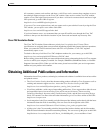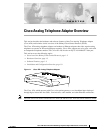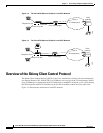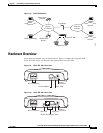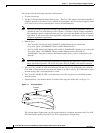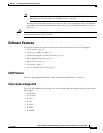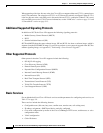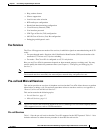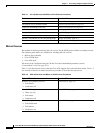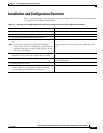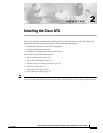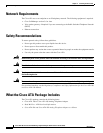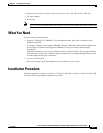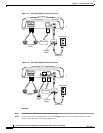
1-7
Cisco ATA 186 and Cisco ATA 188 Analog Telephone Adaptor Administrator’s Guide (SCCP)
OL-3141-01
Chapter 1 Cisco Analog Telephone Adaptor Overview
Software Features
• Ring cadence format
• Silence suppression
• Low-bit-rate codec selection
• RTP media port configuration
• Hook-flash detection timing configuration
• Cisco Discovery Protocol (CDP)
• User interface password
• UDP Type of Service (ToS) configuration
• 802.1P Class of Service (Cos) Bit configuration
• Debugging and diagnostic tools
Fax Services
The Cisco ATA supports two modes of fax services, in which fax signals are transmitted using the G.711
codec:
• Fax pass-through mode—Receiver-side Called Station Identification (CED) tone detection with
automatic G.711A-law or G.711µ-law switching.
• Fax mode—The Cisco ATA is configured as a G.711-only device.
How you set Cisco ATA fax parameters depends on what network gateways are being used. You may
need to modify the default fax parameter values (see Chapter 6, “Configuring and Debugging Fax
Services”).
Note Success of fax transmission depends on network conditions and fax modem response to these conditions.
The network must have reasonably low network jitter, network delay, and packet loss rate.
Pre-call and Mid-call Services
This section provides an overview of telephone services that the Cisco ATA allows the user to perform
either before or during a call. For end-user procedures on how to use these services, see Appendix A,
“How to Use Pre-call and Mid-call Services.”
This section contains the following topics:
• Pre-call Services, page 1-7
• Mid-call Services, page 1-8
Note The services listed in this section are supported by Cisco CallManager. For Cisco IOS Telephony Service
(ITS)-supported services, refer to ITS documentation.
Pre-call Services
Table 1-1 lists the pre-call services that the Cisco ATA supports for the SCCP protocol. Table 1-1 also
includes references to where the user procedure is described for each service.



